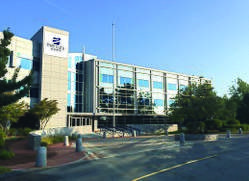Mercury Systems
Mercury Systems, Inc.( NASDAQ: MRCY ) is an American multinational aerospace and defense technology company. It develops and manufactures a wide variety of computer hardware and software products including embedded processing modules and subsystems, avionics mission computers, rugged computer servers, and radio frequency (“RF”) and microwave components, modules, and subsystems.
 | |
 Front entrance of Mercury Systems' headquarters in Andover, MA | |
| Public | |
| Traded as | |
| Industry | Aerospace and defense |
| Founded | 1981 |
| Headquarters | Andover, Massachusetts, United States |
Key people | Mark Aslett[1] (President/CEO) |
| Revenue | $655 million USD (FY 2019)[2] |
Number of employees | ~1,700 (June 2019)[3] |
| Website | www |
Mercury is based in Andover, Massachusetts, with more than 1700 employees in offices around the world and annual revenues of approximately US$655 million for its fiscal year ended June 30, 2019.
History
- Founded on July 14, 1981 as Mercury Computer Systems by Jay Bertelli.
- Went public on the Nasdaq stock exchange on January 30, 1998, listed under the symbol MRCY.
- In July 2005, Mercury Computer Systems acquired Echotek Corporation for approximately US$49 million.[5]
- In January 2011, Mercury Computer Systems acquired LNX Corporation.[6]
- In December, 2011, Mercury Computer Systems acquired KOR Electronics for US$70 million,
- In August 2012, Mercury Computer Systems acquired Micronetics for US$74.9 million.[7]
- In November 2012, the company changed its name from Mercury Computer Systems to Mercury Systems.[8]
- In December 2015, Mercury Systems acquired Lewis Innovative Technologies, Inc. (LIT).[9]
- In May 2016, Mercury Systems acquired the embedded security, RF and microwave, and custom microelectronics businesses of Microsemi Corporation for a total purchase price of US$300 million.
- In November 2016, Mercury Systems acquired CES Creative Electronic Systems, S.A. (“CES”) for approximately US$38 million. The addition of CES adds capabilities in mission computing, safety-critical avionics and platform management.[10]
- In April 2017, Mercury Systems acquired Delta Microwave, LLC (“Delta”) for US$40.5 million, enabling the Company to expand into the satellite communications (SatCom), datalinks and space launch markets.[11]
- In July 2017, Mercury Systems acquired Richland Technologies, LLC (RTL), increasing the Company's market penetration in commercial aerospace, defense platform management, C4I, and mission computing.[12]
- In February 2018, Mercury Systems acquired Themis Computer for US$180 million.
- In July 2018, Mercury Systems acquired Germane Systems, LC for US$45 million.
- In April 2019, Mercury Systems acquired The Athena Group, Inc. (Athena) and Syntonic Microwave LLC (Syntonic) for US$46 million.
- In July 2019, Mercury Systems acquired GECO Avionics, LLC for US$36.5 million.[13]
- In September 2019, Mercury Systems acquired American Panel Corporation (APC) for US$100 million.
Products and Services
Mercury Systems' hardware products are typically designed for compute-intensive, high-bandwidth, high-throughput applications. These products often must also meet significant size, weight and power (SwaP) constraints for use in aircraft, unmanned aerial vehicles (“UAVs”), ships and ground vehicles and be ruggedized for use in harsh environments. They can be used in both commercial aerospace applications, such as transportation, communications, ground radar air traffic control, as well as advanced defense applications, including space-time adaptive processing, synthetic aperture radar, airborne early warning, command, control, communication and information systems, mission planning, image intelligence systems, signal intelligence systems, and precision-guided weapons. The systems can scale from a few processors to thousands of processors. Mercury’s products and solutions have been deployed in more than 300 defense programs with over 25 different aerospace companies and defense prime contractors.
It offers analyst services and systems engineering support, consulting, maintenance and other support, testing and installation. It designs, markets and sells software and middleware environments for the development and execution of signal and image processing applications on a range of heterogeneous and multi-computing platforms.[14]
Facilities
Corporate Headquarters
Mercury is headquartered in Andover, Massachusetts.[15] The facility incorporates a design and engineering capability and an "Innovation Center". Mercury Innovation Centers showcase the company’s sensor and mission processing solutions.[16]
Manufacturing Centers
Mercury has redundant, scalable Advanced Microelectronic Centers (AMCs). AMCs are for the production of defense industry subsystems. AMCs are operated in New England, New York Metro-area, Southern California and a trusted DMEA facility in the Southwest.[15]
Company structure
Mercury has three major product lines:
• Advanced Microelectronic / RF & Digital
• Sensor and Mission Processing - Mercury Mission Systems; Safety-critical avionics, mission processing, networking, and communication; Secure high-performance sensor processing, storage, and networking
• Mercury Defense Systems – Electronic Warfare; Secure Processing; Test & Simulation
Mercury’s businesses are supported by several dedicated international operations including: Toronto, Canada, Silchester, United Kingdom, Tokyo, Japan and Geneva, Switzerland. [17]
References
- https://www.mrcy.com/company-information/management-team/
- "EDGAR Filings Mercury Systems". United States Securities and Exchange Commission. Retrieved 24 June 2020.
- https://www.mrcy.com/company-overview/facts-at-a-glance/
- https://www.mrcy.com/presscenter/pressreleases/pressrelease.aspx?id=1924
- https://www.mrcy.com/presscenter/pressreleases/pressrelease.aspx?id=14795
- "Military and Aerospace Electronics". Retrieved 15 November 2012.
- Mercury Systems (November 13, 2012) Mercury Computer Systems Announces Name Change to "Mercury Systems" press release.
- https://globenewswire.com/news-release/2015/12/16/796160/0/en/Mercury-Systems-Acquires-Lewis-Innovative-Technologies-Inc.html
- https://globenewswire.com/news-release/2016/11/03/886366/0/en/Mercury-Systems-to-Acquire-Mission-Computing-Company-Creative-Electronic-Systems.html
- https://www.mrcy.com/presscenter/pressreleases/pressrelease.aspx?id=16699
- http://mil-embedded.com/news/mercury-systems-acquires-richland-technologies/
- https://www.streetinsider.com/Corporate+News/Mercury+Systems+%28MRCY%29+Reports+Acquisition+of+Avionics+and+Mission+Computing+Business/15052919.html
- "Mercury Systems Inc (MRCY.O)". Reuters. Retrieved 24 June 2020.
- http://www.dmea.osd.mil/home.html
- https://www.mrcy.com/presscenter/pressreleases/pressrelease.aspx?id=16331
- http://www.mrcy.com
External links
- Business data for Mercury Systems: